
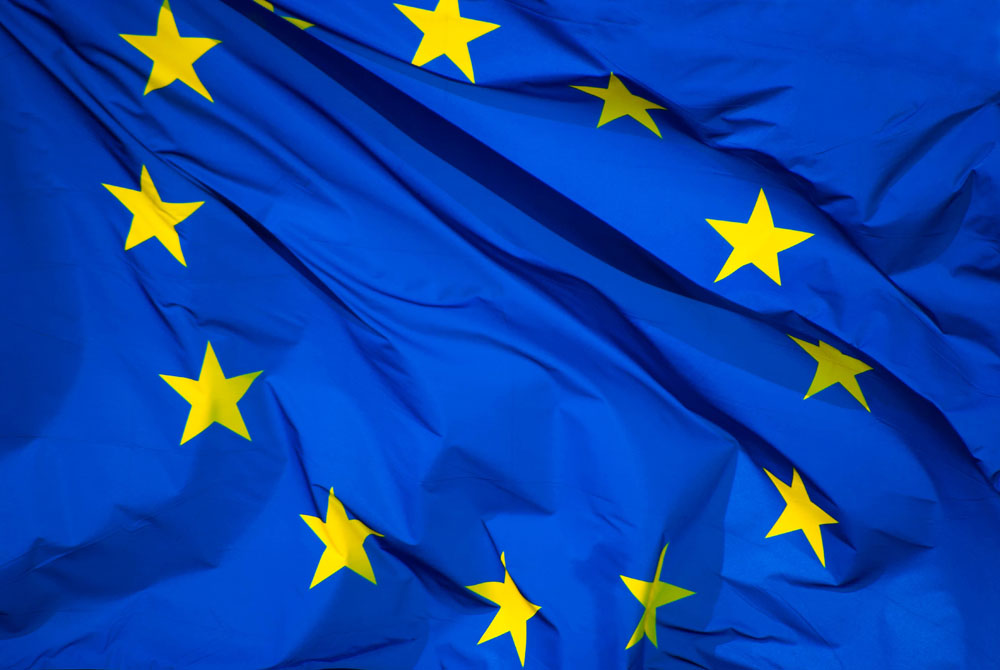
Joint EU-UNWTO report provides better understanding of tourism in the European Union
The new report ‘European Union Tourism Trends’, prepared by the World Tourism Organization (UNWTO) in cooperation with the European Commission, underscores tourism’s major social and economic benefits for 28 countries comprising the European Union (EU). EU destinations welcomed 538 million international overnight visitors in 2017, 40% of the world total. EU accommodation establishments provide over 3 billion nights a year, half of which to domestic guests (residents) and half to international guests. Tourism accounts for 6% of the EU’s overall exports, while the direct contribution of tourism to individual EU economies reaches up to 11% of the GDP.
Preliminary results for 2017 indicate that international tourist arrivals (overnight visitors) grew by 8% in the EU last year, to reach 538 million, or 40% of the world’s arrivals. The EU has enjoyed continued growth in international arrivals following the global economic crisis of 2009, with annual growth rates exceeding 4% in the last five years.
The UNWTO Secretary-General Zurab Pololikashvili stated that “Sustained growth in tourism has been instrumental in the economic recovery of many countries in Europe and around the world, contributing to job creation, economic growth and a healthy balance of payments”
EU countries earned EUR 342 billion in international tourism receipts in 2016 (31% of the world’s total), making a significant contribution to their balance of payments. As EU destinations earn more in international tourism receipts than EU residents spend on international tourism (EUR 315 billion), EU consequently boasts a surplus of EUR 27 billion in the travel trade balance.
International passenger transport (rendered to non-residents) is estimated to have generated another EUR 67 billion, resulting in total export earnings from international tourism of EUR 409 billion. This represents 6% of the EU’s exports of goods and services, making tourism the fourth largest export category, after chemicals, automotive products and food.
Over two million businesses dedicated mainly or partially to tourism operate in the EU, most of them small and medium-sized enterprises (SMEs), employing some 12 million people. For individual EU economies, the direct contribution of tourism to GDP is as high as 11%.
The UNWTO Secretary-General Zurab Pololikashvili added that “Tourism is a key pillar of the EU strategy for jobs and inclusive growth and I am confident that our strong partnership with the European Union will continue to drive the quality, sustainability and competitiveness of the European tourism sector forward”.
EU tourism is driven by both domestic and international visitors. Accommodation establishments in the EU offered 31 million bed-places in 2016. Guests spent a total 3.1 billion nights, half of which were by domestic visitors (residents) and half by international visitors. Of the 1.5 billion international nights, 1.1 billion were spent by guests from EU countries and 413 million by guests from outside the EU.
EU-UNWTO cooperation
The European Union Tourism Trends report provides a comprehensive overview of tourism in the European Union and constitutes a tool for policy makers and other tourism stakeholders for developing market strategies and enhancing the knowledge base of the EU Virtual Tourism Observatory. The report is the result of a cooperation agreement between UNWTO and the Directorate-General for Internal Market, Industry, Entrepreneurship and SMEs of the European Commission (DG GROW) and is part of the ‘Enhancing the Understanding of European Tourism’ initiative. The project aims to improve the socio-economic knowledge of the tourism sector, enhance the understanding of European tourism and contribute to economic growth, job creation and the overall competiveness of tourism in Europe.
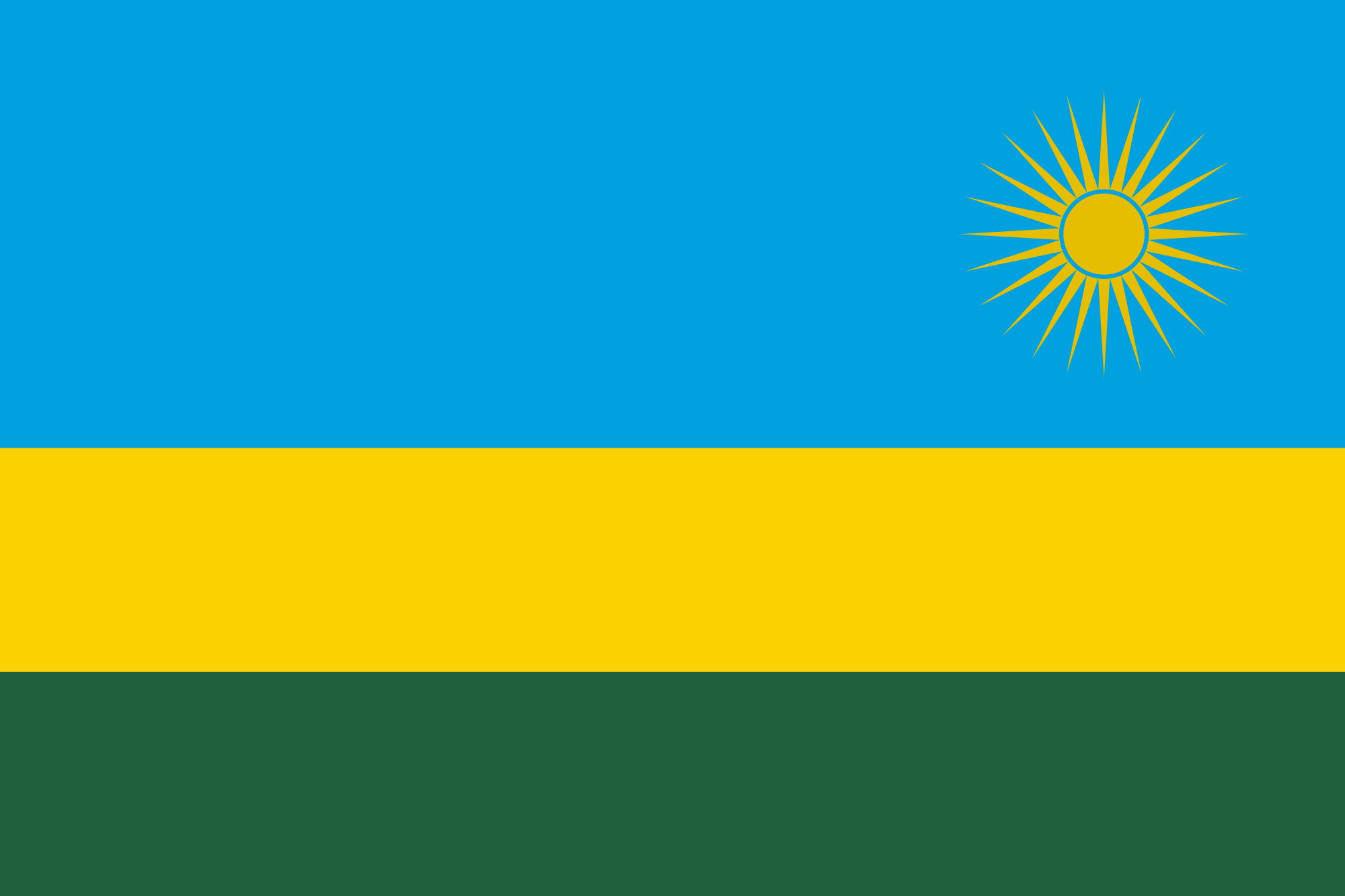
Rwanda honoured with the World Travel & Tourism Council’s first Global Leadership Award
The country of Rwanda has been awarded WTTC’s first Global Leadership Award. The award was presented to Dr. Edouard Ngirente, Right Honourable Prime Minister of Rwanda at the Gala Dinner of the 2018 WTTC Global Summit in Buenos Aires, Argentina.
The WTTC Global Leadership Award will be an annual award which recognises countries which have not only prioritised Travel & Tourism but have put sustainability at the heart of the sector’s development.

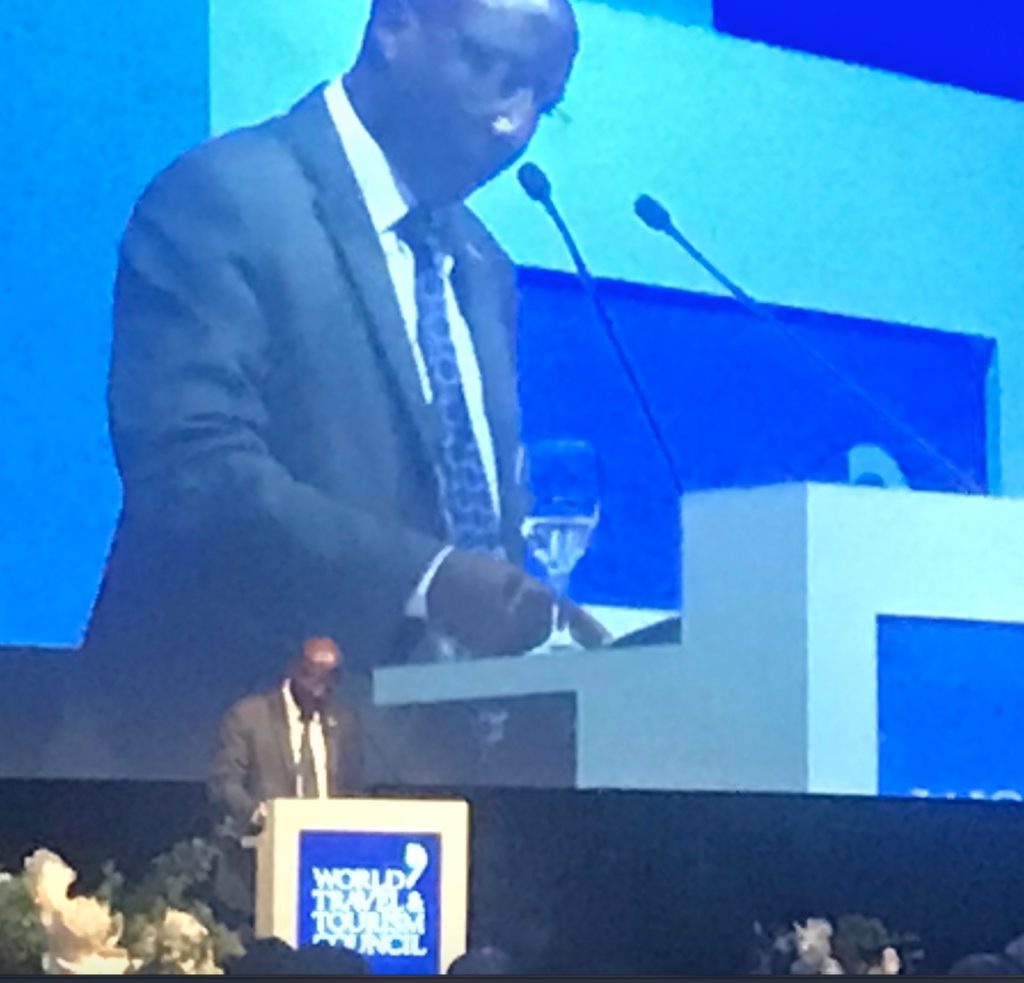
Announcing the award at the Gala Dinner in Buenos Aires, Gloria Guevara WTTC President & CEO said, “Much of the world has heard about Rwanda, but mostly about its troubled history. In 1994, it was the setting for one of the worst genocides in our lifetime. But since then the country has gone from bordering on a failed state and a real-world cemetery to one of the most remarkably transformed countries in Africa, if not the world.
Rebuilt on a strong foundation of reconciliation, and powered by the determination to succeed, Rwanda is now a leader in education and in environmental responsibility. Its economy is robust, helped by a focus on sustainable travel and tourism.
Rwanda now welcomes a million tourists a year. Travel & Tourism represents 13% of the country’s GDP and 11% of employment. And sustainability is at the heart of tourism growth. Initiatives to protect the country’s unique Gorilla population, while generating significant income from the visitors they attract, as well as the establishment of national parks to protect the environment ensure tourism growth benefits not just the natural environment but the communities who live and work there.
It is an honour to present our first Global Leadership Award to such an inspiring and transformative country.”
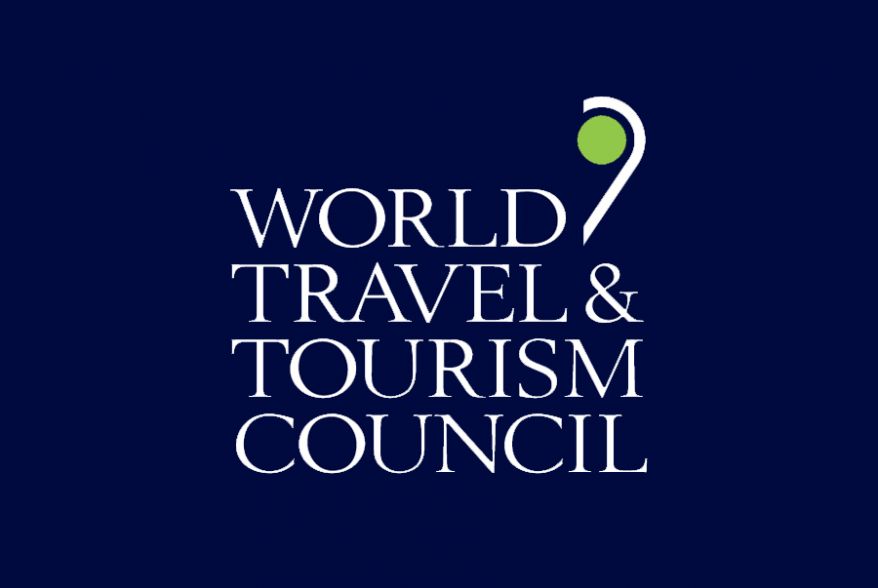
WTTC Members join fight against illegal wildlife trade
The World Travel & Tourism Council (WTTC) has today launched a new initiative for the Travel & Tourism sector to join the global fight against illegal wildlife trade. The ‘Buenos Aires Declaration on Travel & Tourism and Illegal Wildlife Trade’ sets out specific actions that the sector can take to address this challenge.
Speaking at WTTC’s Global Summit in Buenos Aires, Argentina, Gloria Guevara, WTTC President & CEO said “WTTC is proud to be undertaking this new initiative which aims to ensure that our sector is fully engaged in the fight against illegal wildlife trade. This challenge has been identified by our Members as a priority for our sector. Wildlife tourism is a significant generator of income for communities around the world, particularly in least developed countries (LDCs) and the illegal wildlife trade puts at risk not only the biodiversity of our world, but also the livelihoods of these communities. The Buenos Aires Declaration provides a framework for the Travel & Tourism sector to co-ordinate and consolidate actions to address it.”
The Declaration consists of four pillars:
1. Expression and demonstration of agreement to tackle the illegal wildlife trade
2. Promotion of responsible wildlife-based tourism
3. Awareness raising among customers, staff and trade networks
4. Engaging with local communities and investing locally
Specific activities within the pillars include selling only wildlife products that are legal and sustainably sourced, and that meet CITES requirements; promoting only responsible wildlife-based tourism; training staff to detect, identify and report suspected illegal trade in wildlife; and educating consumers as to how they can tackle the problem, including by not buying illegal or unsustainably sourced wildlife products.
Fundamental to the declaration is the role Travel & Tourism can play in providing sustainable livelihoods for those who live and work alongside endangered flora and fauna, and at risk of being illegally traded. This includes promoting the benefits of wild-life tourism and ensuring that wildlife-based tourism positively impacts its local communities, while identifying and encouraging opportunities for investment in local infrastructure, human capital and community development.
John Scanlon, Special Envoy for African Parks and former Secretary General of the International Convention in Trade in Endangered Species (CITES) said: “It is fantastic to see the Travel & Tourism sector join the global fight against illegal wildlife trade. In many places where poaching takes place for illegal trade, Travel & Tourism is one of the few economic opportunities available. Maximising the opportunities for local communities and ensuring that they benefit from wildlife-based tourism, is one of the best ways to stem the flow of illegal trade at its source. On the demand side, with its huge global reach and growing consumer base, Travel & Tourism has a big responsibility to help raise awareness among its customers about wildlife trade and the devastating impacts of illegal wildlife trade.”
Gary Chapman, President Group Services and Dnata, Emirates Group said: “Emirates has been actively committed to the fight against illegal wildlife trade for some years now and we are delighted to support this initiative serving the broader Travel & Tourism sector, which clearly has such a critical role to play particularly within the communities who are most affected by this activity.”
Gerald Lawless, immediate past chair of WTTC, concluded: “As a long-term member and former Chair of WTTC I am delighted that this initiative is underway. I would like to thank the more than 40 Members who have signed the Declaration so far. WTTC research shows that Travel & Tourism accounts for over 9% of GDP in countries such as Kenya and Tanzania, generating jobs for 1 in 11 people. As global Travel & Tourism companies, we can play a substantial and active role to tackle illegal wildlife trade. However, we cannot do this alone and I call on other organisations, both public and private sector, and NGOs already engaged in this fight, to join us by signing the Declaration as we work together to grow wildlife-tourism sustainably and use our reach to stem both the supply and demand for illegal wildlife products around the world.”
Signatories to the Declaration at its launch include: WTTC, Abercrombie & Kent, AIG, American Express, Amex GBT, Best Day Travel Group, BTG, Ctrip, Dallas Fort Worth Airport, DUFRY, Emaar Hospitality, Emirates, Europamundo, Eurotur, Exo Travel, Google, Grupo Security, Hilton, Hogg Robinson, Hyatt, IC Bellagio, Intrepid, JLL, Journey Mexico, JTB, Mandarin Oriental, Marriott, Mystic Invest, National Geographic, Rajah Travel Corporation, RCCL, Silversea Cruises, Swain Destinations, Tauck Inc, Thomas Cook, Travel Corporation, TripAdvisor, TUI, Value Retail, Virtuoso, V&A Waterfront, City Sightseeing, Airbnb, Grupo Puntacana, Amadeus

The Buenos Aires Declaration on Travel & Tourism and Illegal Wildlife Trade
World Travel & Tourism Council (WTTC) has today launched a new initiative for the Travel & Tourism sector to join the global fight against illegal wildlife trade. The ‘Buenos Aires Declaration on Travel & Tourism and Illegal Wildlife Trade’ sets out specific actions that the sector can take to address this challenge.
Speaking at WTTC’s Global Summit in Buenos Aires, Argentina, Gloria Guevara, WTTC President & CEO said “WTTC is proud to be undertaking this new initiative which aims to ensure that our sector is fully engaged in the fight against illegal wildlife trade. This challenge has been identified by our Members as a priority for our sector. Wildlife tourism is a significant generator of income for communities around the world, particularly in least developed countries (LDCs) and the illegal wildlife trade puts at risk not only the biodiversity of our world, but also the livelihoods of these communities. The Buenos Aires Declaration provides a framework for the Travel & Tourism sector to co-ordinate and consolidate actions to address it.”
The Declaration consists of four pillars:
Expression and demonstration of agreement to tackle the illegal wildlife trade
Promotion of responsible wildlife-based tourism
Awareness raising among customers, staff and trade networks
Engaging with local communities and investing locally
Specific activities within the pillars include selling only wildlife products that are legal and sustainably sourced, and that meet CITES requirements; promoting only responsible wildlife-based tourism; training staff to detect, identify and report suspected illegal trade in wildlife; and educating consumers as to how they can tackle the problem, including by not buying illegal or unsustainably sourced wildlife products.
Fundamental to the declaration is the role Travel & Tourism can play in providing sustainable livelihoods for those who live and work alongside endangered flora and fauna, and at risk of being illegally traded. This includes promoting the benefits of wild-life tourism and ensuring that wildlife-based tourism positively impacts its local communities, while identifying and encouraging opportunities for investment in local infrastructure, human capital and community development.
John Scanlon, Special Envoy for African Parks and former Secretary General of the International Convention in Trade in Endangered Species (CITES) said: “It is fantastic to see the Travel & Tourism sector join the global fight against illegal wildlife trade. In many places where poaching takes place for illegal trade, Travel & Tourism is one of the few economic opportunities available. Maximising the opportunities for local communities and ensuring that they benefit from wildlife-based tourism, is one of the best ways to stem the flow of illegal trade at its source. On the demand side, with its huge global reach and growing consumer base, Travel & Tourism has a big responsibility to help raise awareness among its customers about wildlife trade and the devastating impacts of illegal wildlife trade.”
Gary Chapman, President Group Services and Dnata, Emirates Group said: “Emirates has been actively committed to the fight against illegal wildlife trade for some years now and we are delighted to support this initiative serving the broader Travel & Tourism sector, which clearly has such a critical role to play particularly within the communities who are most affected by this activity.”
Gerald Lawless, immediate past chair of WTTC, concluded: “As a long-term member and former Chair of WTTC I am delighted that this initiative is underway. I would like to thank the more than 40 Members who have signed the Declaration so far. WTTC research shows that Travel & Tourism accounts for over 9% of GDP in countries such as Kenya and Tanzania, generating jobs for 1 in 11 people. As global Travel & Tourism companies, we can play a substantial and active role to tackle illegal wildlife trade. However, we cannot do this alone and I call on other organisations, both public and private sector, and NGOs already engaged in this fight, to join us by signing the Declaration as we work together to grow wildlife-tourism sustainably and use our reach to stem both the supply and demand for illegal wildlife products around the world.”
Signatories to the Declaration at its launch include: WTTC, Abercrombie & Kent, AIG, American Express, Amex GBT, Best Day Travel Group, BTG, Ctrip, Dallas Fort Worth Airport, DUFRY, Emaar Hospitality, Emirates, Europamundo, Eurotur, Exo Travel, Google, Grupo Security, Hilton, Hogg Robinson, Hyatt, IC Bellagio, Intrepid, JLL, Journey Mexico, JTB, Mandarin Oriental, Marriott, Mystic Invest, National Geographic, Rajah Travel Corporation, RCCL, Silversea Cruises, Swain Destinations, Tauck Inc, Thomas Cook, Travel Corporation, TripAdvisor, TUI, Value Retail, Virtuoso, V&A Waterfront, City Sightseeing, Airbnb, Grupo Puntacana, Amadeus

The winners are… : WTTC 2018 Tourism for Tomorrow Awards
WTTC is delighted to announce the 2018 leaders in sustainable tourism at the 2018 Tourism for Tomorrow Awards ceremony. The Awards, which were presented at a special ceremony during the 18th WTTC Global Summit in Buenos Aires, Argentina, celebrate inspirational, world-changing tourism initiatives from all over the globe.
The 2018 Awards winners are highly commended and recognised for business practices of the highest standards that balance the needs of ‘people, planet and profits’ within our sector. This year’s winners are industry leaders who promote inclusive growth, and work toward a greener future as a result of their proactive contributions to sustainable development and the UN’s Sustainable Development Goals (SDGs).
The 2018 Tourism for Tomorrow Awards winners are:
Community Award – Global Himalayan Expedition, India
Destination Award – Thompson Okanagan Tourism Association, British Colombia, Canada
Environment Award – Airport Authority Hong Kong, Hong Kong
Innovation Award – Virgin Atlantic, UK
People Award – Cayuga Collection of Sustainable Luxury Hotels and Lodges, Costa Rica
The Awards are judged by a panel of independent experts, led by Graham Miller, Executive Dean, Faculty of Arts and Social Sciences at the University of Surrey. Academics, business leaders, NGO and governmental representatives all join forces to whittle down the finalists to just five Winners. Becoming a Tourism for Tomorrow judge is not a task to be taken lightly – the stringent, three-stage judging process includes a thorough review of all applications, followed by on-site evaluations of the Finalists and their initiative.
The winner of each category is determined by the winners’ selection committee which is chaired by Fiona Jeffery OBE, Tourism for Tomorrow Awards Chair, and composed of: Sandra Howard Taylor, Vice Minister of Commerce, Industry and Tourism of Colombia; John Spengler, Director of the Centre for Health and the Global Environment of the Harvard School of Public Health; and Darrell Wade, Co-Founder and CEO of Intrepid Group.
Gloria Guevara Manzo, President & CEO, WTTC, commented:“This year the Tourism for Tomorrow Award finalists prove just how diverse and all-encompassing our sector’s commitment to sustainable growth is. The award categories are designed to demonstrate that every player in the Travel & Tourism industry has a role to play in driving the sector to a more responsible future — whether providing training to people from disadvantaged backgrounds, protecting vital wetland areas via ecotourism or operating the world’s greenest airport. I congratulate them all on their achievements and leadership.
This year’s award winners demonstrate not only that tourism can be sustainable, but that it provides tangible benefits to destinations, local communities and travellers. We hope that our award winners will motivate the Travel & Tourism sector to be part of a more sustainable world.”
Fiona Jeffery, OBE, Chair, WTTC Tourism for Tomorrow Awards, stated: “The role of the Tourism for Tomorrow Awards is to showcase some of the most outstanding examples of sustainable tourism practise in the world and inspire and motivate our industry to be the change we want to see and experience. The Tourism for Tomorrow 2018 finalists and winners each demonstrate vision, leadership, and a long-term commitment to ensuring our industry focuses on creating better places for people to live in and better places for people visit. This year however we have seen more cross sector collaboration and an acknowledgement that steps can and should be taken to assess tourism impacts more effectively which is an encouraging development.”
Jeff Rutledge, CEO, AIG Travel, the headline sponsors of the Awards, said: “From operating the world’s greenest airport to establishing Africa’s first marine park, this year’s Tourism for Tomorrow finalists are a diverse group of change makers from all over the globe. The 2018 winners demonstrate that regardless of size or purpose, all businesses in the Travel & Tourism sector can make sustainability a priority and become part of our collective journey towards a greener future.”
For more information on the Tourism for Tomorrow Awards and all the winners, please visit www.wttc.org/tourism-for-tomorrow-awards
Full List of Winners and Finalists:
Community Award
WINNER – Global Himalayan Expedition, India
FINALIST – &Beyond, South Africa
FINALIST – Sustainable Development Institute Mamirauá, Brazil
Destination Award
WINNER – Thompson Okanagan Tourism Association, British Colombia
FINALIST – Riverwind Foundation, Jackson Hole, Wyoming, USA
FINALIST – Corporación Parque Arví, Colombia
Environment Award
WINNER – Airport Authority Hong Kong, Hong Kong
FINALIST – Chumbe Island Coral Park, Tanzania
FINALIST –Melia Hotels International, Spain
Innovation Award
WINNER – Virgin Atlantic, UK
FINALIST – Parkbus – Transportation Options, Canada
FINALIST – Yayasan Karang Lestari Teluk Pemuteran (Pemuteran Bay Coral Protection Foundation), Indonesia
People Award
WINNER – Cayuga Collection of Sustainable Luxury Hotels and Lodges, Costa Rica
FINALIST – Heritage Watch, Australia
FINALIST – TREE Alliance, Cambodia
About the Tourism for Tomorrow Awards:
More details on the Awards and the application process can be found at http://wttc.org/tourism-for-tomorrow-awards/
Tourism for Tomorrow Award Partners:
Headline Sponsor of the Tourism for Tomorrow Awards: AIG Travel Inc.
Category Sponsors:
Community Award Sponsor: Value Retail
Destination Award Sponsor: Las Vegas Convention & Visitors Authority
Environment Award Sponsor: Ecolab
Innovation Award Sponsor: Amadeus
People Award Sponsor: Mastercard
Awards Supporters:
Adventure Travel Trade Association (ATTA)
African Travel and Tourism Association (ATTA)
Asian Ecotourism Network (AEN)
BestEn Travel
Considerate Hoteliers
Ecotourism Japan
The EUROPARC Federation
Fair Trade Tourism (FTT)
The Global Sustainable Tourism Council (GSTC)
GreenHotelier/International Tourism
Partnership (ITP)
Pacific Asia Travel Association (PATA)
Rainforest Alliance
The Long Run
Tony Charters & Associates
Travelife
Travel+SocialGood
Voyageons Autrement

WTTC members investing $1.9 billion for Argentina tourism
Christopher J. Nassetta, Chairman, WTTC and President & CEO, Hilton, announced this morning the investment of $1.9 billion USD in Argentina by WTTC members over the coming years. The announcement was made in front of Mauricio Macri, Argentine President, and more than 100 industry-leading CEOs at the WTTC Annual General Meeting in Buenos Aires, Argentina.
“It’s an honour to be here in Argentina and, speaking on behalf of WTTC’s membership, we could not be more pleased to witness first-hand the benefits of the investment that’s happening here,” said Nassetta. “In total across the country, Travel & Tourism supports 1.8 million jobs today, and we expect to add another 300,000 jobs here over the next decade with our collective investment of nearly $2 billion an important driver of this growth.”
Policies implemented by Argentine President Macri have helped stabilise the economy and his clear message that, after many years of protectionist policies, Argentina is open for business is a positive move for tourism. The substantial investment is a testament to Argentine President Macri’s continued support and commitment to the Travel & Tourism sector.
During a summit among the Tourism Minsters of the G20 economies, yesterday, Argentine President Macri has asked to take his message of support to the G20 World Leaders’ meeting in November.
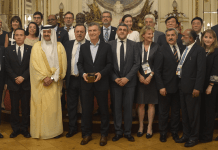
UNWTO joins Tourism Ministers in calling upon G20 Leaders to prioritize tourism
The World Tourism Organization (UNWTO) joined the Ministers of Tourism of the G20 economies meeting in Buenos Aires in calling upon the G20 leaders to consider including tourism in their Agenda for its capacity to create more and better jobs.
In his meeting with the President of Argentina, Mauricio Macri, and current G20 Chair, UNWTO Secretary-General, Zurab Pololikashvili, stressed the capacity of tourism to create jobs and the need to advance the adaptation of the sector to the digital transformation.
The 8th Meeting of the Tourism Ministers of the G20 economies was held in Buenos Aires on 17 April under Argentine’s Presidency of the G20 with a focus on the Future of Work – Tourism’s leading role in sustainable development: a driver for employment.
In line with the priorities of Argentine’s G20 Presidency, which include the ‘Future of Work’, the meeting focused on how tourism can embrace innovation and technology, foster new skills development to create new decent jobs.
“We need to promote the role that tourism has in shaping the future of our world as the sector that will create more jobs in the coming decade” said the Minister of Tourism of Argentina, Gustavo Santos, opening the Meeting.
Ambassador Daniel Raimondi, Vice Minister of Foreign Affairs and Worship of Argentina stressed the future of work as one of Argentine’s G20 priorities and it’s link to tourism, a sector which is key to create jobs, develop infrastructure and exports.
“Let us embrace the technological revolution and unleash its potential to create more and better jobs in our sector, making tourism a true pillar of the G20 objectives of inclusive and sustained growth” said UNWTO Secretary-General, Zurab Pololikashvili, in his opening remarks to the Meeting.
Ministers of Tourism of the G20 economies agreed on considering the following:
– Encouraging policies that promote full and productive employment and facilitate the progress of innovation in tourism and foster the creation of decent jobs, sustainable enterprises and entrepreneurship, in particular among women and the youth;
– Establishing favourable frameworks to stimulate innovation, entrepreneurship and connect ecosystems linking start-ups, main companies, investors and governments along the tourism value chain;
– Creating cooperation mechanisms between educational institutions at all levels, the private sector, governments and technology partners to review educational programmes and skills development policies
– Considering the importance of SMEs in the tourism, heritage and cultural sectors due to their contribution to job creation as well as their role in preserving and promoting cultural resources;
– Promoting the use of digital technology to facilitate travel as well as involving technology stakeholders in national tourism policies
In 2016, G20 countries received 904 million international tourist arrivals, which generated over US$ 1 trillion or 6.3% of all G20 exports.
The Government of Japan will host the 9th Meeting of the Tourism Ministers of the G20 economies in Kutchan Town, Hokkaido in 2019.
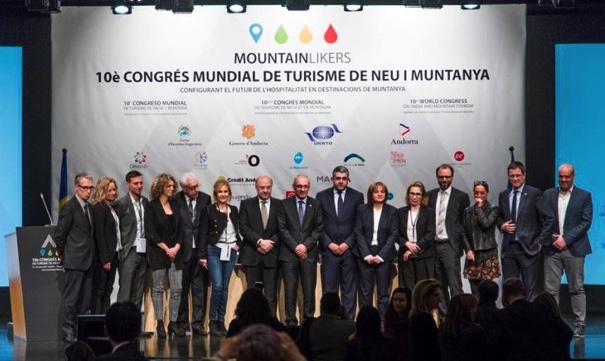
Snow and Mountain Tourism faces the challenge of adapting to change
Madrid, Spain, 27 March 2018 – The 10th World Congress on Snow and Mountain Tourism (Andorra, 21-23 March 2018) highlighted the need to adapt tourism accommodation to the expectations of today’s customers and to increase the quality of the traveller’s experience, while identifying knowledge management and hospitality culture as keys to success.
Organized jointly by the seven communes of the Principality, the Government of Andorra and the World Tourism Organization (UNWTO), this Congress constitutes a permanent forum for debate on the development and sustainability of tourism in mountain areas.
More than 400 participants attended the tenth edition of the Congress, including around thirty speakers from more than 16 countries and experts from Spain, the United States, Finland, France, Greece, Japan, the United Kingdom and Switzerland, among many others.
At the closing of the Congress, UNWTO Secretary-General Zurab Pololikashvili stressed the importance for mountain destinations to not only provide responses to the changing demands of travellers, but also to cover areas that range from “the need to build infrastructure and sustainable accommodations, quality professional training, as well as combating seasonality and optimizing resources”.
As a conclusion of the discussions over three days, the experts highlighted aspects that should mark the roadmap to follow for this segment of international tourism:
The tourism sector came out of the crisis reaching a record number of tourists and tourism accommodation supply and is taking the necessary steps to cater to a customer profile that is increasingly more demanding and more experienced.
Digitalization and globalization have created tourists with habits and expectations that are very different from those of traditional visitors, thus requiring products to be adapted to changing expectations on the demand side.
Certain aspects on the supply side must continue to be improved, keeping in mind that the quality of the visitor’s experience should be the central axis of this evolution.
Being able to offer hotels, ski slopes and tourism facilities that satisfy tourists is just one of the aspects that guarantee the success of a mountain destination. But there are other factors involved, such as knowledge management, the quality of services and the culture of hospitality.
University training and experiences are applicable to tourism activity, and in this regard, observation and research studies in mountain destinations have helped develop sustainable environments.
New digital platforms must offer security and trust for both owners and guests. In the area of accommodation regulations, Andorra presented its new legislation and highlighted its five objectives: respond to new customer behaviours, improve equity among groups of accommodations, reduce unlicensed operations and facilitate the regulation of illegal accommodation, and improve the quality and safety of visitors. In addition, Andorra has introduced online reputation for the first time as a new criterion for the classification of accommodation.

Leaving UNWTO: Yolanda Perdomo, Director of UNWTO Affiliate Members Program
Earlier this week Yolando Perdomo submitted her farewell letter to UNWTO Affiliated members.
The circumstances about her leaving are speculated about.
Yolanda has experience in both the public and private sectors and is an expert in tourism destination promotion and distribution. She has been Vice-Counselor for Tourism for the Government of the Canary Islands and Managing Director of PROMOTUR, the tourism promotion organization of the Canary Islands. There she directed communication and promotion campaigns for tourism, strategic plans, statistical and competitive analysis, loyalty campaigns and the creation of product clusters with the aim of diversifying and differentiating tourism products.
With InnovaTurismo, Yolanda has managed tourism projects in the private sector and has also been Director of the BungalowsClub booking portal, as well as Business Development Manager at Tourism Revolution Ecosystem (TRE). Currently, she is a professor at the Master of Tourism and Public Administration, a joint programme of the Spanish Tourism Office (Turespaña) and the National Institute for Public Administration, as well as a lecturer for the Executive Master in Innovation, Commercialization and Efficiency in Tourism (eMITur) at the ESCOEX International Business School.
Born in Lanzarote in the Canary Islands (Spain), Yolanda graduated in International Economics from the American University of Paris, studied Tourism at ULPGC and is an EU Politics and Collaboration expert for UNED and Jean Monnet Chair. She lived five years in France one year in the United States, three years in Italy and now works in Madrid. She speaks English, French and Italian. She was a member of the International Advisory Board of the Vienna Tourist Board during the development of its 2020 strategy and Doctor Honoris Causa for the University of Tourism and Management of Skopje, FY Republic of Macedonia.
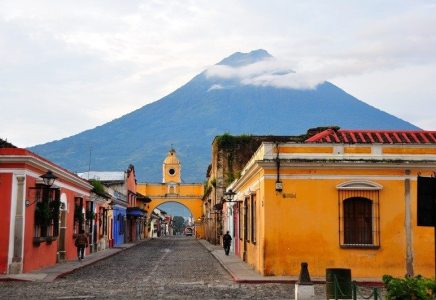
UNWTO: Good tourism practices to advance sustainable development in the Americas
Concrete examples of how to advance sustainable development through tourism take centre stage in the first joint publication between the World Tourism Organization (UNWTO) and the Organization of American States (OAS). ‘Tourism and the Sustainable Development Goals: Good Practices in the Americas’ provides 14 case studies from across the region on why tourism ranks high among the economic sectors better positioned to enable the Agenda 2030 for Sustainable Development and its 17 Sustainable Development Goals.
Ranging from tourism projects to strengthen the peace process in Colombia to initiatives in the heart of the Peruvian Amazon, addressing climate change in Mexico or providing insight into management and sustainability systems in Honduras or Panama. A total of 14 case studies portray the contribution of tourism to advance the Sustainable Development Goals in the Americas.
‘Tourism and the Sustainable Development Goals: Good Practices in the Americas’ recommends to pay critical attention to tourism management as well as to strengthening partnerships between national and international public and private stakeholders, as well as local communities. The report also addresses the emergence of a more responsible traveler and how destinations in the region should integrate resource efficiency and multi-stakeholder involvement in their policies, actions and initiatives.
“With more than 200 million international tourists who traveled to the Americas in 2017, tourism can and must play a significant role in delivering solutions for sustainable development in the region”, said UNWTO Secretary-General, Zurab Pololikashvili. “I am grateful for the partnership with the Organization of American States and am confident that together we will support tourism’s role in the sustainable development agenda of the region up to and beyond 2030”, he added.
According to the Executive Secretary for Integral Development of the OAS, Kim Osborne, this joint effort “provides greater awareness on how tourism can help address poverty alleviation, protect biodiversity and cultural heritage, and support community development in the Americas”.
Authorities at all levels in the Americas have identified tourism as a priority sector to promote economic development and diversification and countries across the region are adopting new legislation and policies in this direction. Against this backdrop, ‘Tourism and the Sustainable Development Goals: Good Practices in the Americas’ provides insight into how a common approach – including policy makers, private sector, tourists and the development community – can catalyze sustainable development through tourism.
The report was presented during the 2018 Inter-American Congress of Ministers and High-level Authorities of Tourism, under the theme ‘Connecting the Americas through sustainable tourism’.
